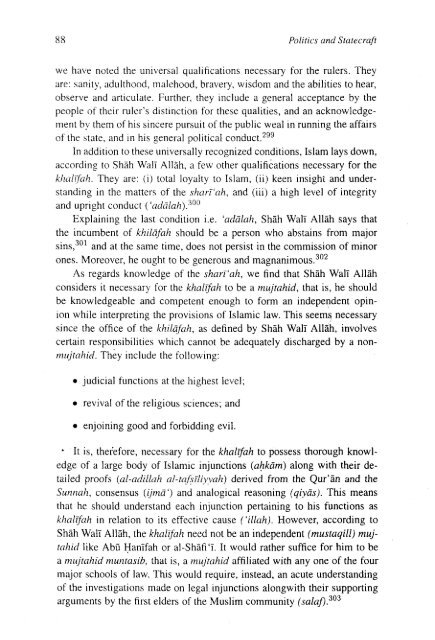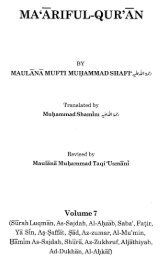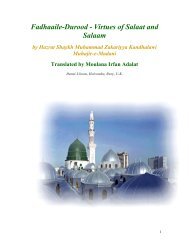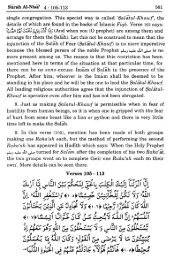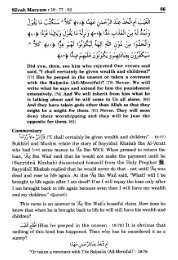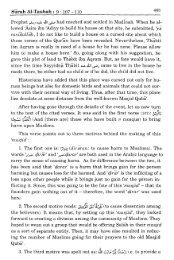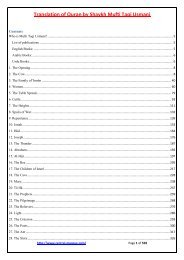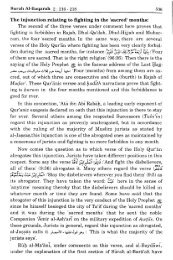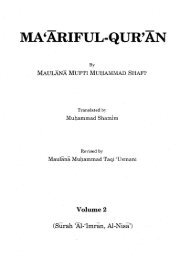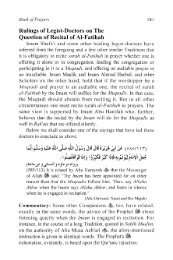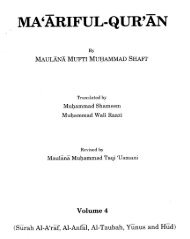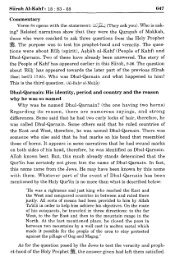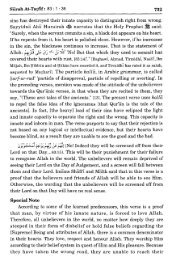Socio Political Thought Of Shah WaliAllah Rahmatullahi Alaihi
Socio Political Thought Of Shah WaliAllah Rahmatullahi Alaihi
Socio Political Thought Of Shah WaliAllah Rahmatullahi Alaihi
Create successful ePaper yourself
Turn your PDF publications into a flip-book with our unique Google optimized e-Paper software.
88 Politics and Statecraft<br />
we have noted the universal qualifications necessary for the rulers. They<br />
are: sanity, adulthood, malehood, bravery, wisdom and the abilities to hear,<br />
observe and articulate. Further, they include a general acceptance by the<br />
people of their ruler's distinction for these qualities, and an acknowledge-<br />
ment by them of his sincere pursuit of the public weal in running the affairs<br />
of the state, and in his general political conduct.2gg<br />
In addition to these universally recognized conditions, Islam lays down,<br />
according to <strong>Shah</strong> Wali Allah, a few other qualifications necessary for the<br />
kllcllifafah. 'They are: (i) total loyalty to Islam, (ii) keen insight and under-<br />
standing in the matters of the shari'ah, and (iii) a high level of integrity<br />
and upright conduct ('add~ah).~~'<br />
Explaining the last condition i.e. 'addlah, <strong>Shah</strong> Wali Allah says that<br />
the incumbent of khiliifah should be a person who abstains from major<br />
sins,301 and at the same time, does not persist in the commission of minor<br />
ones. Moreover, he ought to be generous and magnanimous.302<br />
As regards knowledge of the shari'ah, we find that <strong>Shah</strong> Wali Allah<br />
considers it necessary for the khalijah to be a rnujtahid, that is, he should<br />
be knowledgeable and competent enough to form an independent opin-<br />
ion while interpreting the provisions of Islamic law. This seems necessary<br />
since the office of the khildjuh, as defined by <strong>Shah</strong> Wali Allah, involves<br />
certain responsibilities which cannot be adequately discharged by a non-<br />
nzyjrahici. he^ include the following:<br />
judicial functions at the highest level;<br />
revival of the religious sciences; and<br />
enjoining good and forbidding evil.<br />
It is, theiefore, necessary for the khalgah to possess thorough knowl-<br />
edge of a large body of Islanlic injunctions (ahkiim) along with their de-<br />
tailed proofs (a/-aciillah a/-tafiili.y.ynh) derived from the Qur'Bn and the<br />
Sunnah, consensus (ijmd') and analogical reasoning (qiyiis). This means<br />
that he should understand each injunction pertaining to his functions as<br />
khalijah in relation to its effective cause ('illah). However, according to<br />
<strong>Shah</strong> Wali Allilh, the klzalijalz need not be an independent (mustaqill) muj-<br />
tahicl like Abii Hanifah or al-Shafi'i. It would rather suffice for him to be<br />
a mu~tahid muizrasib, that is, a mr4Jtahid affiliated with any one of the four<br />
major schools of law. This would require, instead, an acute understanding<br />
of the investigations made on legal injunctions alongwith their supporting<br />
arguments by the first elders of the Muslim community ( ~alaf).~~~


